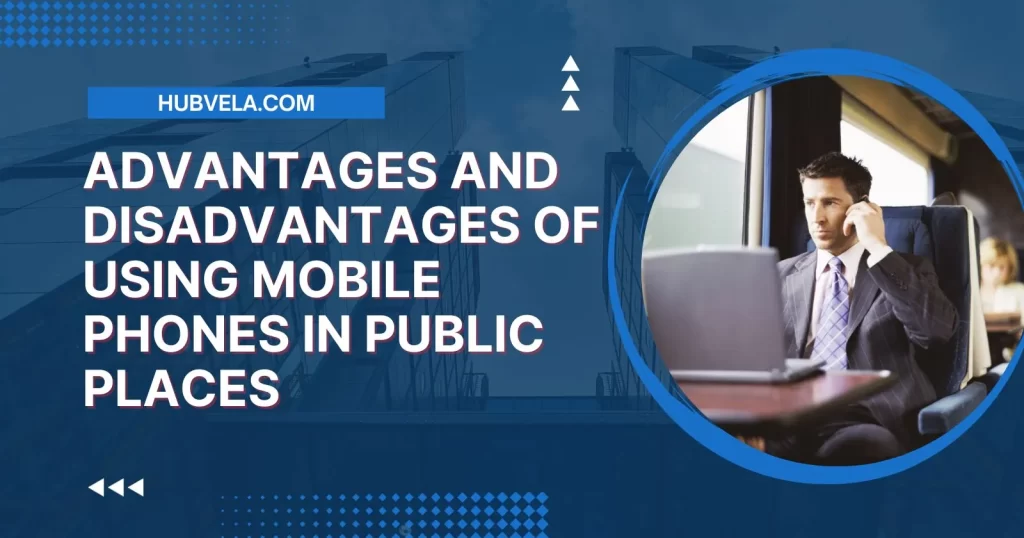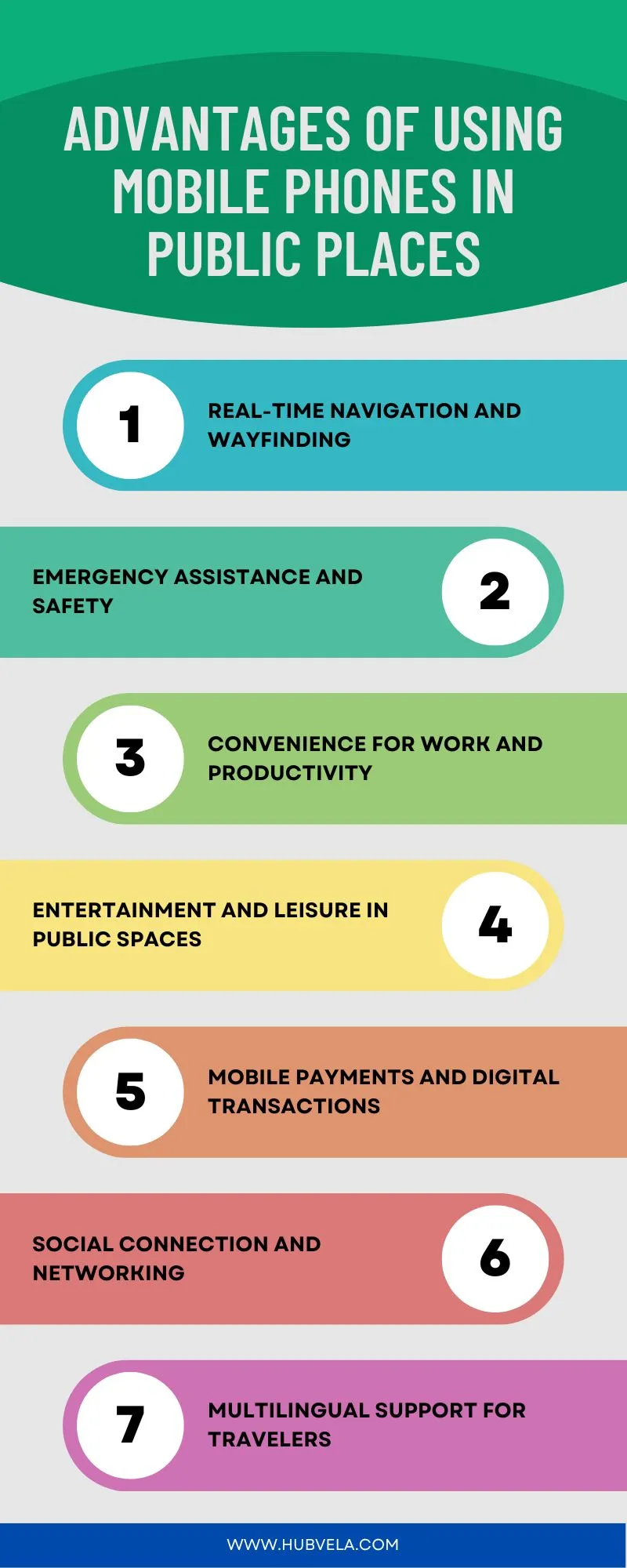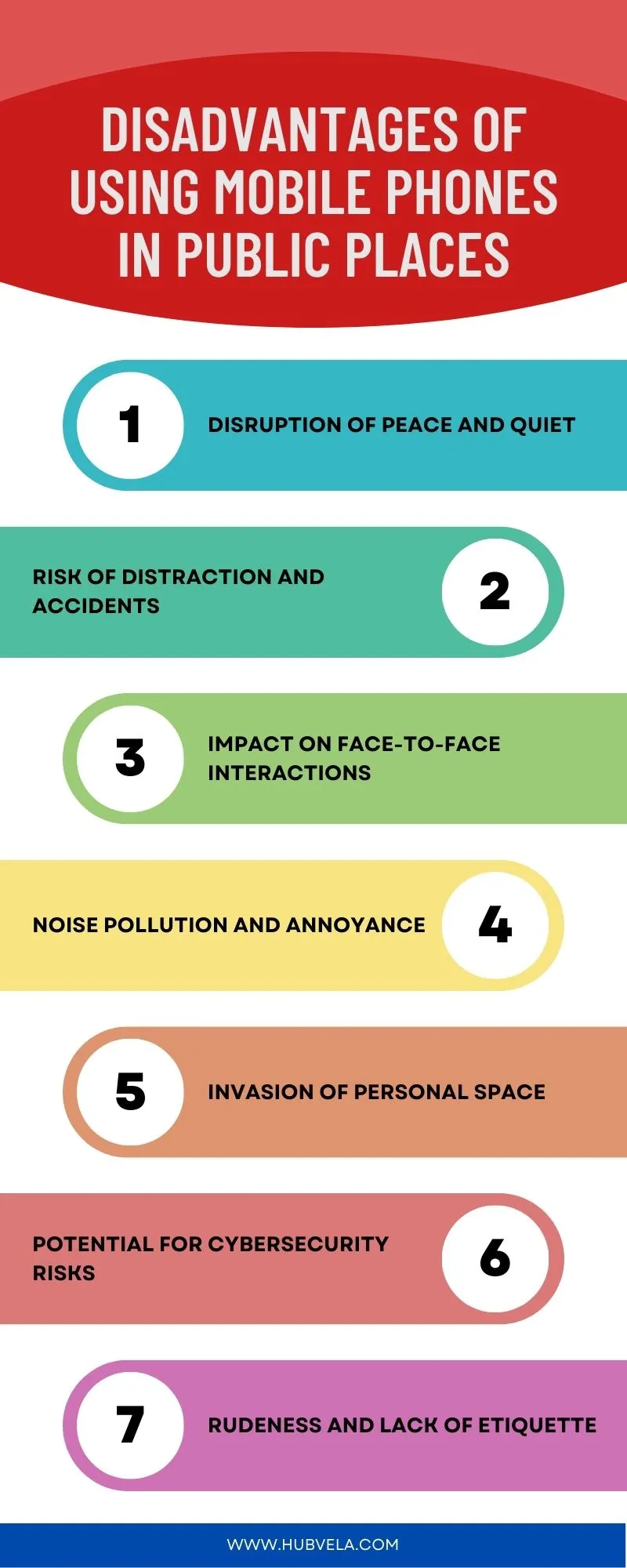Mobile phones have become an integral part of our lives, and it is hard to imagine a day without them. They have revolutionized the way we communicate and have made our lives easier in many ways.
However, the use of mobile phones in public places has been a topic of debate for a long time.
While some people argue that it is convenient to use mobile phones in public places, others believe that it is a nuisance and should be banned. In this article, we will discuss the advantages and disadvantages of using mobile phones in public places.

--Advertisement--
Advantages of Using Mobile Phones in Public Places
Mobile phones have become an integral part of our daily lives. They have revolutionized the way we communicate, work, and entertain ourselves.
With the advancement of technology, mobile phones have become more than just a device for making calls and sending messages. They have become multi-functional devices that can be used for various purposes.
One of the advantages of using mobile phones is that they can be used in public places. We will discuss the advantages of using mobile phones in public places.

1. Real-Time Navigation and Wayfinding
Real-time navigation and wayfinding are significant advantages of using mobile phones in public places. With the help of GPS technology, mobile phones can provide real-time directions and navigation to users.
This feature is particularly useful for people who are new to a place or are visiting a crowded area for the first time. Mobile phones can also help users find nearby landmarks, restaurants, and other points of interest.
In addition, mobile phones can provide real-time traffic updates and suggest alternative routes to avoid congestion.
Real-time navigation and wayfinding a valuable features of mobile phones that can make traveling in public places more convenient and efficient.
2. Emergency Assistance and Safety
Mobile phones have become an essential tool for emergency assistance and safety in public places.
Public safety officers require smartphones that are durable, have a good display quality and size, push-to-talk capabilities, good battery life, and performance and storage.
Samsung has supported public safety for years by providing smartphones and other mobile solutions that improve critical information access, productivity, and safety, regardless of the assignment.
In terms of school safety, cell phones have been used by students in a number of cases nationwide for calling in bomb threats to schools.
However, school and safety officials must “double down” on their planning and preparedness for issues likely to be created by cell phone use during a crisis.
School leaders should talk with students, parents, and staff about their expectations regarding cell phone use during a crisis.
3. Convenience for Work and Productivity
Mobile phones have become an essential tool for convenience in the workplace, boosting productivity and enhancing portability.
With the ability to operate wirelessly, mobile technology promotes and enhances portability for its users, eliminating the need to carry heavy laptops to work.
Digitizing files for easier access online also eliminates the need to carry or look through bulky documents.
Mobile technology also makes client and employee data accessible from a distant location, resulting in the removal of restrictions on businesses and global barriers.
Mobile devices offer workers greater flexibility, enhance workflows, improve communications, and help to make users more efficient and productive.
However, excessive use of mobile devices for work purposes at home can lead to an increase in self-perceived productivity but also in stress-related levels of somatic symptoms and the need for recovery.
4. Entertainment and Leisure in Public Spaces
Entertainment and leisure in public spaces have been revolutionized by the widespread use of mobile phones. With the advent of smartphones, people can now access a wide range of entertainment options on the go.
For instance, they can watch movies, listen to music, or play games while waiting for a bus or train. Additionally, mobile phones have made it easier for people to connect with others and share their leisure experiences.
They can take photos or videos of their surroundings and share them on social media platforms, allowing others to experience the same entertainment and leisure activities.
Mobile phones have made entertainment and leisure in public spaces more accessible, convenient, and enjoyable for people.
5. Mobile Payments and Digital Transactions
Mobile payments and digital transactions have become increasingly popular in recent years, and they offer several advantages when it comes to using mobile phones in public places.
One of the most significant benefits is convenience. With mobile payments, users can quickly and easily make purchases without the need for cash or credit cards.
This is particularly useful in crowded public places where carrying a wallet or purse can be cumbersome.
Additionally, mobile payments are often more secure than traditional payment methods, as they use encryption and other security measures to protect users’ financial information.
Finally, mobile payments and digital transactions can help to reduce the spread of germs, as users do not need to physically exchange cash or cards with merchants.
The use of mobile phones for payments and transactions can make life easier and more convenient for users in public places.
6. Social Connection and Networking
Mobile phones have revolutionized the way people connect and network with each other. With the advent of social media platforms and messaging apps, mobile phones have become an indispensable tool for social connection and networking.
People can easily stay in touch with their friends and family, no matter where they are, through instant messaging, voice and video calls, and social media updates.
Mobile phones have also made it easier for people to expand their social networks by connecting with like-minded individuals and groups through social media platforms.
In public places, mobile phones can be used to network with new people, share experiences, and even collaborate on projects.
The ability to connect with others instantly and easily has made mobile phones an essential tool for social connection and networking.
7. Multilingual Support for Travelers
Mobile phones have become an essential tool for travelers, especially with the multilingual support they offer. With just a few taps on the screen, travelers can easily communicate with friends, family, and locals in a foreign country.
Mobile phones allow travelers to send text messages, make phone calls, and even surf the internet. Using the local cell phone service is the most affordable option, especially for local calls.
Text messaging is another convenient way to keep in touch. Mobile phones also give travelers instant access to information whenever they need it, such as directions to a new restaurant or figuring out how to fix a broken appliance.
With so many features available, it’s no wonder that mobile phones have become such an integral part of travelers’ lives.
Disadvantages of Using Mobile Phones in Public Places
Mobile phones have become an integral part of our daily lives. They have made communication easier and more convenient.
However, the use of mobile phones in public places has become a topic of debate. While some people believe that it is acceptable to use mobile phones in public places, others think that it is not appropriate.
We will discuss the disadvantages of using mobile phones in public places. The disadvantages include:

1. Disruption of Peace and Quiet
Using mobile phones in public places can disrupt the peace and quiet of those around you. The constant ringing, beeping, and talking can be distracting and annoying to others who are trying to enjoy their surroundings.
In addition, people may feel like their privacy is being invaded if they are forced to overhear someone else’s conversation. This can be especially true in places like libraries, museums, and movie theaters where people expect a certain level of quiet.
It is important to be considerate of others when using your mobile phone in public places and to keep the volume low or use headphones to avoid disturbing those around you.
2. Risk of Distraction and Accidents
Using mobile phones in public places can pose a risk of distraction and accidents. When people are engrossed in their phones, they tend to lose awareness of their surroundings, which can lead to accidents.
For instance, they may bump into other people, trip over obstacles, or even walk into traffic. Moreover, using mobile phones while driving or crossing the road can be particularly dangerous, as it diverts the attention of the user from the road and increases the risk of accidents.
In addition, using phones in public places can be a source of annoyance to others, as the sound of ringtones, notifications, and conversations can be disruptive and distracting.
Therefore, it is important to exercise caution and restraint when using mobile phones in public places and to prioritize safety and consideration for others.
3. Impact on Face-to-Face Interactions
Mobile phones have become an integral part of our lives, but they have also brought about several disadvantages. One of the major drawbacks of using mobile phones in public places is the impact on face-to-face interactions.
People tend to get engrossed in their phones, scrolling through social media or texting, and ignore the people around them.
This behavior can lead to a lack of communication and social skills, which can be detrimental to personal and professional relationships.
Additionally, excessive phone use in public places can be disruptive and annoying to others, leading to a decline in social etiquette. Therefore, it is important to be mindful of our phone usage and prioritize face-to-face interactions to maintain healthy relationships.
4. Noise Pollution and Annoyance
Noise pollution and annoyance are some of the major disadvantages of using mobile phones in public places. The constant ringing, beeping, and talking on mobile phones can be very disturbing to others in the vicinity.
According to a study conducted by the World Health Organization, noise pollution can cause annoyance, sleep disturbance, and even hearing loss.
The use of mobile phones in public places can also be a source of distraction, leading to accidents and injuries. In addition, the use of mobile phones in public places can be seen as a breach of privacy, as conversations can be overheard by others.
Therefore, it is important to be considerate of others and use mobile phones in public places only when necessary.
5. Invasion of Personal Space
The invasion of personal space is a major disadvantage of using mobile phones in public places. People often use their phones without regard for those around them, leading to loud conversations and distractions.
This can be particularly frustrating in places like libraries, museums, and theaters where people expect a quiet and peaceful environment.
Additionally, the use of mobile phones in public places can be seen as antisocial, as people are too busy sending messages to talk to the people in front of them.
The signal from mobile phones can also cause problems in some public places, such as hospitals, by interfering with delicate instruments or equipment.
The invasion of personal space is a significant disadvantage of using mobile phones in public places that can lead to frustration and annoyance for those around the user.
6. Potential for Cybersecurity Risks
Mobile phones have become an integral part of our lives, but they also come with potential cybersecurity risks.
Cybercriminals can exploit vulnerabilities within mobile devices and the mobile operating system, making them susceptible to malicious apps, network-level attacks, and data leakage.
Mobile phone users are also vulnerable to phishing voice calls and SMS/MMS messages, known as “vishing” and “smishing,” respectively.
Additionally, mobile devices can be lost or stolen, which can lead to physical threats to mobile devices and the loss of sensitive information.
Therefore, it is important to take precautions to protect mobile devices from cybersecurity risks, such as using strong passwords, avoiding public Wi-Fi networks, and keeping software up to date.
7. Rudeness and Lack of Etiquette
Using mobile phones in public places can lead to rudeness and a lack of etiquette. Many people use their phones without considering the impact on those around them, such as talking loudly on the phone, playing music without headphones, or texting during conversations.
This behavior can be disruptive and disrespectful to others, leading to bans on cell phone use in businesses and public places.
Additionally, using mobile phones in public places can be distracting and disturbing to others who are trying to concentrate, such as in libraries or during a performance.
It is important to be mindful of others and practice good etiquette when using mobile phones in public places.
Conclusion on Advantages and Disadvantages of Using Mobile Phones in Public Places
In conclusion, the use of mobile phones in public places has both advantages and disadvantages. On the one hand, mobile phones allow people to stay connected with their loved ones and provide a sense of security.
On the other hand, they can be intrusive and disturb others, especially in quiet or intimate settings such as libraries, theaters, and churches.
While some people believe that mobile phones should be banned in public places, others argue that they should be allowed with proper etiquette.
According to a Pew Research Center survey, about three-quarters of all adults, including those who do not use cell phones, say that it is “generally OK” to use cell phones in unavoidably public areas, such as when walking down the street, while on public transportation, or while waiting in line.
However, mobile phones should be turned off or put on silent mode in quiet or intimate settings to avoid disturbing others. In conclusion, the use of mobile phones in public places should be balanced with respect for others’ privacy and comfort.


